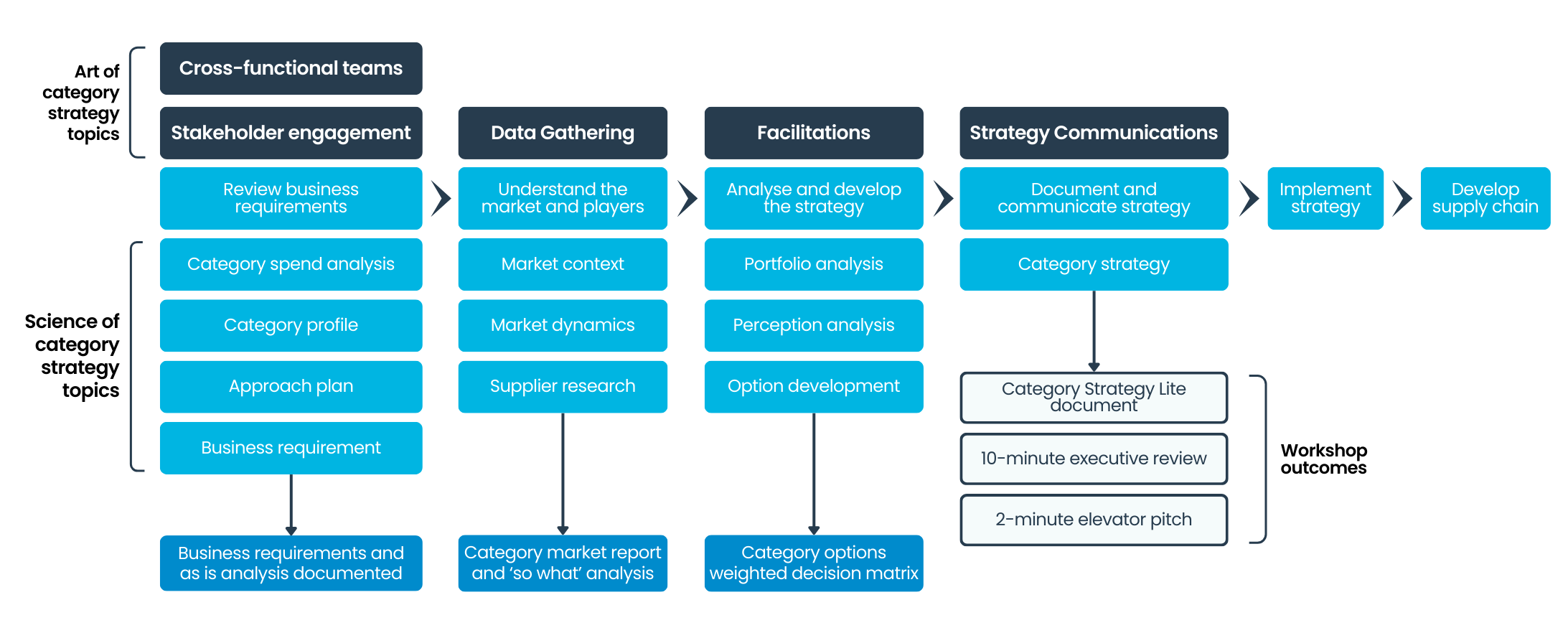Category Strategy Refresh
Overview
Having a well-structured and comprehensive category strategy and category plan is important. However, it also needs to be created in line with your business strategy and then communicated, understood and supported by a wider network of stakeholders.
Format: 4 online modules over 4, 90-min sessions (Vary per region)
Public training course cost (excluding tax):
| North America | US$ 1,400 |
| EMEA | £1,120 |
| Asia Pacific | AUD$ 2,050 |

Scheduled Public Training Course
Join the following Category Management training course

November-December
Dates: Nov. 10, 17, 24, Dec. 1
Time: 10:00 am - 12:30 pm AEDT
Format: 6 online modules over 4, 150-min sessions.
Cost: AUD$ 2,800 (excl tax) per person, including one-to-one coaching & materials.
Register now

October
Dates: Oct. 8, 15, 22 & Nov. 5
Time: 02:00 pm - 3:30 pm UK time
Format: 4 online modules over 4, 90-min sessions.
Cost: £1,120 (excl tax) per person, including one-to-one coaching & materials.
Course Content
The course will be delivered across 4 modules and will enable you to learn how to:
- Evaluate the current situation within the business and review existing sourcing, market structure and dynamics.
- Perform market analysis to develop and evaluate options to meet the business requirements through an aligned category strategy.
- Communicate the category strategy to stakeholders for formative purposes and disseminate an approved strategy.
Participants should use a live category (or subcategory) as their case study.
All course attendees will receive a complete suite of support resources – templates and reference material – to ensure a consistent approach to SRM is embedded into your organisation.
Learning Objectives
The approach to category management training deliberately addresses technical and behavioural skills in the context of the job and enables individuals to be trusted commercial advisors.
Technical Category Management:
• Buying the things the business needs (vs. wants) both now and in the future.
• Research supply markets and build a ‘so-what’ analysis.
• Facilitate the development of strategic category options.
• Document the category strategy.
Behavioural Category Management:
• Stakeholder engagement.
• Leading cross-functional teams.
• Influence without (direct) authority.
• Deliver internal ‘sales pitches’ that build support.
How is it delivered?
Training is delivered through three key activities to ensure students are engaged and applying their learnings:
Workshop The taught part of a module is delivered as a highly focused, instructor-led 90-minute session in an interactive and engaging format (virtually or in person).
Assignments Students apply the module’s content to the job by completing a set of assignments, taking 1–2 hours per module to complete. Ideally, This on-the-job activity should focus on a live category (or sub-category) to make the training relevant and bring its value to life.
Coaching Throughout the assignment period, students get access to the course leader for 1:1 coaching support to build on their understanding and ensure effective implementation.
Modular Programme: The highly modular format of this programme enables flexibility and allows you to balance operational pressure with training delivery.
What you will get?
Reference Materials
The reference manual is designed to accompany the training and provide the visuals, exercise templates and a complete set of notes so that the student has a complete record of the material taught. The page layout is designed with a deep page margin to allow students to make notes alongside the course content.
The reference manual follows the modular structure of the course.
Templates
A set of templates that together form a concise but comprehensive category strategy summary is provided. Each participant completes these as they progress through the training and complete the assignments. Exercise by exercise builds into a complete category strategy and stakeholder engagement plan.

Leading global bank chooses State of Flux as a training partner
Training enhances stakeholder engagement and adds value to leading global banks.
Operating in a complex and regulated environment, our client focuses on increasing value and managing risk in its supply chains through investing in SRM training.
Specialised Training and Development Offerings




















